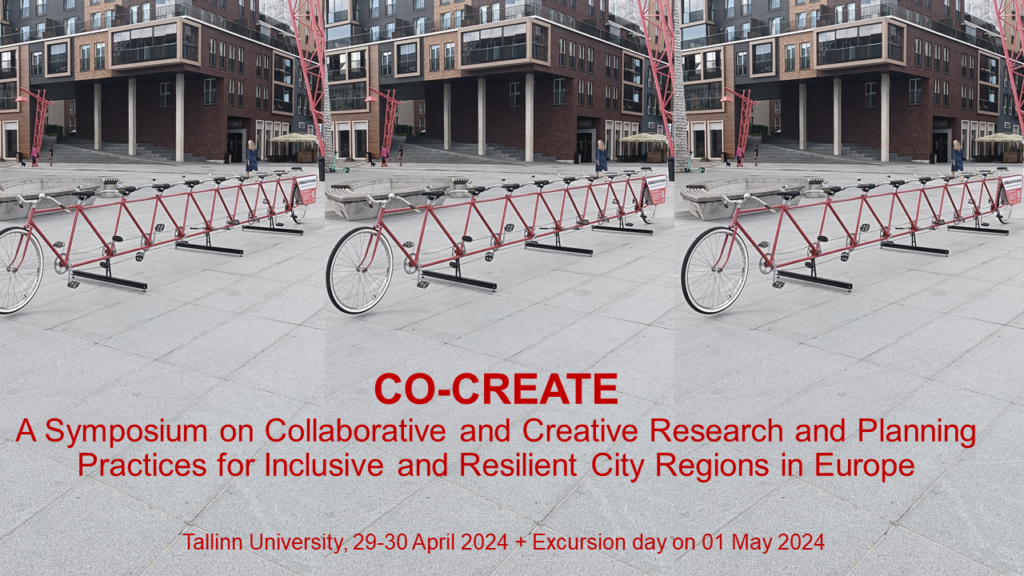
The CO-CREATE Symposium is a Symposium on Collaborative and Creative Research and Planning Practices for Inclusive and Resilient City Regions in Europe. Over three days, we will create a platform for sharing best practices, experiences and challenges in collaborative and creative research and planning for more inclusive, resilient and equitable urban regions.
Programme
Monday, 29 April 2024
Location: Tallinn University Mare Building, Uus-Sadama 5, 10120 Tallinn
| 09:30 – 10:00 | Registration and Coffee (M-224) |
| 10:00 – 10:15 | Welcome (M-218) |
| 10:15 – 11:00 | Presentation: The democratic qualities of Urban Living Labs as tools for mobility justice – Towards a framework for analysis (M-218) Dalia Mukhtar-Landgren, Lund University Chiara Vitrano, VTI – The Swedish National Road and Transport Research Institute |
| 11:00 – 12:30 | Morning break-out sessions |
| Room 1 : Planning for multimodal mobility (in Estonian) (M-226) Multimodaalse liikuvuse planeerimine linna äärealadel: Jagatud vastutuse loomine säästva liikuvuskultuuri kujundamiseks Lagedi näitel Planning for multimodal mobility in peri-urban areas: Working towards shared responsibilities for a sustainable mobility transition Õnne Kask and Tauri Tuvikene, Tallinn University Room 2: Sketching Workshop (M-227) Sketching as a research method Aleksandra Ianchenko, Tallinn University | |
| 12:30 – 13:30 | Lunch at Kohvik Oaas |
| 13:30 – 14:40 | Workshop (M-218/M-226) Transformative learning through urban experimentation? Dipl.-Ing. Anna Caroline Aigner Bsc, TU Wien, Vienna |
| 14:45-15:45 | Plenary presentations (M-218) |
| Integrative Urban Development – Five Approaches to Stakeholder Management Sari Hirvonen-Kantola, University of Oulu, Oulu School of Architecture / UNIC The European University of Cities in Post-Industrial Transition Participation in planning processes: insights into practice Lhamo Meyer, Ampio Partizipation, Zurich Creating dialogue in a complex urban renewal project–Case Linnakaupunki in Turku Silja Laine, University of Turku | |
| 15:45 – 16:15 | Coffee Break (M-224) |
| 16:15 – 17:45 | Panel Discussion: Responsibilities and Challenges in Participatory Planning and Research (M-218) |
| Input and moderation by Lela Rekhviashvili, Leibniz Institute for Regional Geography, Leipzig Discussants: Dalia Mukhtar-Landgren, Õnne Kask, Lhamo Meyer, Sari Hirvonen-Kantola | |
| 17:45 – 18:20 | Closing remarks and discussion |
| 18:30 – 20:30 | Dinner at Kohvik Oaas |
Tuesday, 30 April 2024
Location: Tallinn University Mare Building, Uus-Sadama 5, 10120 Tallinn
| 09:30 – 10:00 | Registration and Coffee (M-224) |
| 10:00 – 10:30 | Presentation: Embodied ethnography: entering the field unprepared (M-218) Veriko Dundua, Tallinn University |
| 10:30 – 11:30 | Workshop (M-227) The asset-based community development approach Andrea di Bernardo, DIST, Polytechnic and University of Turin |
| 11:30 – 12:30 | Lunch at Kohvik Oaas |
| 12.30 – 13.30 | Activity: Let’s Create an Exhibition (M-649) Aleksandra Ianchenko, Tallinn University |
| 13:30 – 14:00 | Coffee Break (M-224) |
| 14:00 – 16:00 | Afternoon break-out sessions |
| Room 1: Individual Activities and Games (M-649 / M-227) Room 2: Thesis Defence (M-648) Public Transport as Contested Public Space: Fare Policies and Daily Mobilities in Tallinn and Brussels Louise Sträuli, Tallinn University | |
| 16:00 – 17:30 | Drinks & Closing (M-649) |
Wednesday, 01 May 2024
Meeting Point: Tallinn University – BFM Court Yard
| 11:00 | Excursion: 10 years of participatory activism in the post-Soviet panel district of Lasnamäe (Tallinn) |
| We invite you to take part in a walk in the Lasnamäe district, the largest “sleeping district” in the Baltic countries (120,000 inhabitants) with different and sometimes profoundly difficult post-soviet issues. During the walk, we will talk about our experience of activism, which is often related with the questions of urban planning and transformation of open space by the forces of the residents of the district themselves. It is always important to talk about context, if we speak of some individual initiatives, so we propose to look at both the district itself and the places that we have changed and continue to change. Our association of active residents of the district is called “Lasnaidea” and has existed for 10 years (started in autumn 2014). During this time, we conducted many events and spatial interventions, trying to change (often successfully) both the urban environment itself and the image of the district. We tested different methods of involving residents of the district (street art, excursions, community gardening, open-air cinema, etc.), which showed different effectiveness. During the walk, we will discuss which of these methods we continue to use, and which we have abandoned. |
This event is financially supported by the Tallinn University School of Humanities and CARIN-PT project funded by JPI Urban Europe research and innovation program under grant agreement No 101003758


